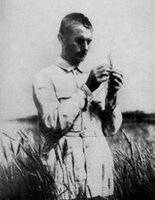
What happens when ideology becomes more important than scientifical critical thinking?
Trofim Lysenko (see picture), quickly became a very prominent "scientist" in the soviet union following an article printed in Pravda (aka "the truth") about this barefooted peasant who "solved problems". Even though he had little education and was barely literate Lysenko progressed rapidly in the soviet system and it did not take many years before he controlled much of the agricultural policy in the soviet union. Lysenko was a practical man who cared about practical issues rather than theoretical nonsense. When something appealed to Lysenko's intuition there was really no need for rigorous testing, consider for instance his citation "In order to obtain a certain result, you must want to obtain precisely that result; if you want to obtain a certain result you will obtain it". When he had achieved a powerful position in the soviet union Lysenko's intuition became so important that criticzing him was associated with grave dangers. Nikolai Vavilov, a Russian biologist who have made important contributions to genetics was one of Lysenko's many victims
Lysenko did not believe in Darwin's theory of evolution because organisms do not "compete", they co-operate. Based on this belief Lysenko ordered that trees should be planted in groups so that they would co-operate (perhaps he was a well-meaning man after all). The result: only 5% of the trees planted flourished, 15% survived, huge economical costs to the soviet union. Lysenko also believed that environment meant everything. Give a seed a good environment and it will flourish. The result of this: availability of meat and vegetables was no higher in 1953 than in 1900 when Tsar Nicholas II reigned the country, millions of Russians starved. In fact, Lysenko even believed that one could easily change one species into another species by manipulating the environment, and indeed "scientists" began reporting studies in which they changed bacteria into viruses and even a rabbit into a chicken!
This history shows the danger of letting ideals steer science. Though he may have been a well meaning man, Lysenko ignored what was known about agriculture and the Russian people suffered the consequences. As I have previously argues, I think it would be a mistake to ignore what we know about human nature when we design our society. Under what conditions do people tend to co-operate, and when do we not co-operate?, what differences between the sexes should we expect and accept rather than fight against (and which should we fight against)? I think that the most important lesson of the above is that whatever ideological motives we have we should not let these motives affect the way we do scientific research...
Wasn't Lysenko a Lamarckian? He thought you could increase the quality of a crop by growing it under terse conditions, as it would automatically develop resistances to those terse conditions and then yield more. Something like that.
SvaraRaderaThis isn't anything new. Dawkins talks about it in The Extended Phenotype. These kinds of discoveries pop up with regular intervals and I don't know if it's all that weird. A lot I think can probably be put down to maternal effects. Even so it still comes down to DNA and how it works in the end - I'm with Dawkins on this one.
SvaraRadera